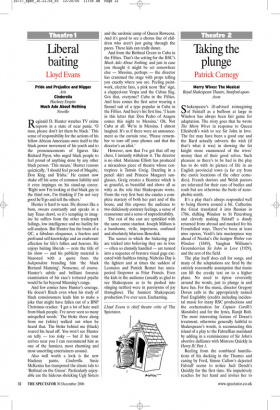Taking the plunge
Patrick Carnegy
Merry Wives: The Musical Royal Shakespeare Theatre, Stratford-upon Avon
Shakespeare’s ill-advised reimagining of Falstaff as a buffoon at large in Windsor has always been fair game for adaptation. The story goes that he wrote The Merry Wives in response to Queen Elizabeth’s wish to see Sir John in love. The fee may have been a good one and the Bard actually subverts the wish (if that’s what it was) in showing the fat knight more enamoured of the wives’ money than of their good selves. Such pleasure as there’s to be had in the play has to do with its picture of life in an English provincial town (a far cry from the exotic locations of the other comedies). French doctors and Welsh pastors are tolerated for their care of bodies and souls but are otherwise the butts of xenophobic mirth.
It’s a play that’s always responded well to being thrown around a bit. Catherine the Great translated it into Russian in 1786, shifting Windsor to St Petersburg and cleverly making Falstaff a dandy returned from abroad and mocked for his Frenchified ways. There’ve been at least nine operas, Verdi’s late masterpiece way ahead of Nicolai’s Die lustigen Weiber von Windsor (1849), Vaughan Williams’s Greensleevian Sir John in Love (1929), and the rest of the field.
The play itself does call for songs, and many of the adaptations are fired by the entirely reasonable assumption that music can lift the creaky text on to a higher plane. No need to tiptoe reverently around the words, just to plunge in and have fun. For the music, director Gregory Doran calls in the appropriately named Paul Englishby (credits including incidental music for many RSC productions and the orchestration for Captain Corelli’s Mandolin) and for the lyrics, Ranjit Bolt. The most interesting feature of Doran’s treatment, otherwise generally faithful to Shakespeare’s words, is reconnecting this island of a play to the Falstaffian mainland by adding in a reminiscence of Sir John’s abortive dalliance with Mistress Quickly in Henry IV, Part 1.
Reeling from the combined humiliations of his ducking in the Thames and caning by Ford, Simon Callow’s dejected Falstaff seems to notice Judi Dench’s Quickly for the first time. He impulsively reaches for her hand and invites her to join him in his chamber. Touched by this unanticipated proposition from across the years, she softly reprises her earlier song, ‘Honeysuckle Villain’ — one of the musical’s too-few memorable tunes. It’s a rare moment of emotional complexity, its pathos eventually exploded by the sudden appearance of Brendan O’Hea’s swaggeringly saturnine Pistol and Quickly’s capitulation to his wolfish advances.
This scene and other little Doran touches help Callow rescue something of the life-enhancing character of the Henry IV plays from the interminable trials imposed upon the pseudo-Falstaff of The Merry Wives. Callow and Dench have a brave stab at putting across their musical numbers, though there’s not much they can do with song that they don’t know how to do better with words. Perhaps this is another way of saying that Englishby’s score seems not so much a musical development from within the play as the imposition of the banalities from every stereotypical West End show you’ve ever seen.
Echoes of Les Mis and of Lloyd Webber at his most mawkish are never far away, especially in the numbers worked in to build up the decoratively vacuous Fenton and Anne Page into romantic hero and heroine. There’s even less reason to expand Ford’s brief apology for his manic jealousy (‘Pardon me, wife. Henceforth do what thou wilt’) into a sentimental number that culminates in kisses and a loving embrace. The best numbers are those for the sparky wives — Alexandra Gilbreath as a compactly chic Mistress Ford and Haydn Gwynne as a lankily bespectacled Mistress Page — and for three excellent comic turns in Simon Trinder’s Slender, Paul Chahidi’s Dr Caius and Ian Hughes as the Welsh parson, Sir Hugh Evans.
The ensemble song-and-dance routines, choreographed by Michael Ashcroft, culminate with something of a winner in ‘Merry Wives’, a hit in every sense as it picks up on Ford’s cudgelling of Falstaff (when lucklessly disguised as the old woman of Brainford) by having the company beat out the syncopated rhythm on every pot, pan and dustbin within sight. Like much else in the score it’s in parodistic mode, with an American hoedown bizarrely modulating into an Elizabethan dance. Blink, and you could have imagined you saw Mistress Quickly cartwheeling across the front of the stage. Blink again and you’ll see Dame Judi’s Queen Elizabeth from Shakespeare in Love presiding over Falstaff’s crowning humiliation at the hands of the hobgoblins and fairies of Windsor Forest. But I much hope I was mistaken in thinking that the absurdly abused knight suffered an ultimate ignominy in having to take his farewell with some such unand indeed anti-Bardic line as ‘We must be contented with our lot’, a catastrophe that even the reprise of ‘Merry Wives’ couldn’t begin to erase.





































 Previous page
Previous page